Everyone knows the importance of brushing twice a day to keep teeth fresh and clean, but just how much does regular brushing affect your body? Liz Barnett looks at the latest studies to find out more
As a child you are always told to brush your teeth every morning and night, but what effect does this actually have on our bodies? A study from the University College of London published in May this year found that those with poor oral hygiene have an increased risk of heart disease compared to people that brush their teeth twice a day. It has been established that inflammation in the body, including the mouth and gums, can cause further problems such as clogged arteries and slow circulation which can ultimately be life threatening. Charlotte Wake (pictured above), Dental Therpist at the Meon Dental Practice in Petersfield says: “It has already been established that there is a strong link between cardiovascular disease and poor oral hygiene. Research is continuing in this area and will be for many years to come, but obviously the maintenance of a healthy mouth through regular dentist and dental hygienist visits is paramount for general well being.”Brushing twice a day keeps the mouth protected from plaque and bacteria, which reduces gum disease and the chances of infection. Once the gums are infected the bacteria can work its way in to the bloodstream and begin to attack the rest of your body but when your gums are healthy, the bacteria in your mouth are broken down by your saliva and the chance for infection and inflammation is dramatically reduced.Regular brushing and flossing together with the use of a good mouthwash that contains fluoride will definitely help towards keeping your mouth germ free, but what else can we do to protect our bodies from the teeth down?
Eat healthilyWe all know the importance of good nutrition in terms of staying healthy and fit but what we eat also has a massive impact on our oral hygiene. Our teeth are protected by enamel and dentine designed to shield the tooth from plaque and decay, foods and drinks that are high in acidity break down the enamel and expose the yellowy dentine which can lead to sensitivity and tooth decay. Try and avoid sugary or acidic foods in-between meals or chew a sugar-free gum to help the production of saliva.
TechniqueTo thoroughly clean your teeth it should take you around two minutes both in the morning and at night. You should choose a small-headed toothbrush and use short, gentle strokes paying particular attention to your gum line, hard to reach back teeth and any crowns or fillings as these are more susceptible to plaque build up and disease. There is evidence that some varieties of electric toothbrush are more effective at removing plaque than normal toothbrushes but it doesn't mean that you can cut corners, the way you brush your teeth and the length of time you spend is the most important factor.
LifestyleMany of you have seen those horrific pictures on the side of cigarette packets that show the effects that smoking has on your teeth and gums and even drinking alcohol, especially with sugary mixtures, can lead to gum disease and even mouth cancer. Prolonged use of tobacco and alcohol can also weaken your immune system making it easier for the bacteria in your mouth to work its way in to the rest of your body, and so it is so important to maintain good oral health to ensure that your teeth and gums are given as much protection as possible.


























